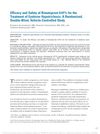Search
for
Sort by
Research
270-300 / 515 results
research Comprehensive Evaluation of Low-Level Laser Therapy Effectiveness for Treating Hair Loss
Low-level laser therapy effectively treats hair loss and promotes hair growth.

research Active Ingredients and Procedures in Androgenetic Alopecia
The review found that PRP is the most effective treatment for hair loss with few side effects.
research Frontal Fibrosing Alopecia and Reproductive Health: Assessing the Role of Sex Hormones in Disease Development
Hormonal imbalances during menopause may significantly contribute to Frontal Fibrosing Alopecia.

research The Spectrum of Hair Loss in Patients with Mycosis Fungoides and Sézary Syndrome
Some patients with mycosis fungoides or Sézary syndrome experience hair loss, which may be similar to alopecia areata or linked to skin lesions, possibly due to abnormal T cells, and bexarotene can help treat it.

research Thu646 Postmenopausal Hyperandrogenism Secondary To Ovarian Leydig Cell Tumor
A woman's increased facial hair and hair loss were caused by a rare ovarian tumor, cured by surgery.

research Association of Myotonic Dystrophy with Autoimmune Endocrinopathies and Thyroid Carcinoma
A patient with myotonic dystrophy had several autoimmune disorders and thyroid cancer, suggesting a possible link between these conditions.

research The Role of Vitamin D3 Deficiency in the Etiopathogenesis of Autoimmune Thyroid Diseases
Low vitamin D3 is not linked to different levels of thyroid hormones in people with autoimmune thyroid disease.

research Risk Factors and Characterization of Vitiligo and Alopecia Areata in Patients With Chronic Graft-Versus-Host Disease
Female donor to male recipient sex mismatch and positive ACA-IgG are key risk factors for vitiligo and alopecia areata in chronic GvHD patients.

research The Role of AUTS2 in Neurodevelopment and Human Evolution
The AUTS2 gene is linked to neurological disorders and may affect human brain development and cognition.

research CXCR3 Blockade Inhibits T Cell Migration Into the Skin and Prevents Development of Alopecia Areata
Blocking the CXCR3 receptor reduces T cell accumulation in the skin and prevents hair loss in mice.

research Does Prostaglandin D2 Hold the Cure to Male Pattern Baldness?
Prostaglandin D₂ might be targeted for new male pattern baldness treatments.

research Hypothesis: Wound-Induced TLR3 Activation Stimulates Endogenous Retinoic Acid Synthesis and Signalling During Regeneration
Activating TLR3 may help produce retinoic acid, important for tissue regeneration.

research Wound Healing
Wound healing is complex and requires more research to enhance treatment methods.

research Gender Differences in Skin: A Review of the Literature
Male and female skin differ due to hormones, affecting conditions like hair loss, acne, and skin cancer, and suggesting a need for gender-specific treatments.

research Cutting Edge: Memory Regulatory T Cells Require IL-7 and Not IL-2 for Their Maintenance in Peripheral Tissues
Memory regulatory T cells need IL-7, not IL-2, to stay in peripheral tissues.

research The Inflammatory Caspases-1 and -11 Mediate the Pathogenesis of Dermatitis in Sharpin-Deficient Mice
Certain proteins, caspases-1 and -11, are important in the early development of skin inflammation in mice.

research Novel Cosmeceuticals from Plants: An Industry-Guided Review
Plant-based ingredients are effective and safe for modern skincare products.

research Identification of an Intronic Regulatory Element Necessary for Tissue-Specific Expression of Foxn1 in Thymic Epithelial Cells
A specific DNA region is crucial for Foxn1 gene expression in thymus cells but not in hair follicles.

research Efficacy and Safety of Bimatoprost 0.01% for the Treatment of Eyebrow Hypotrichosis
Bimatoprost 0.01% effectively and safely improves eyebrow growth.

research Skin Deep and Deeper: Multiple Pathways in Basal Cell Carcinogenesis
The research suggests new treatments for skin cancer could target specific cell growth pathways.

research Erratum to: Squarticles as a Lipid Nanocarrier for Delivering Diphencyprone and Minoxidil to Hair Follicles and Human Dermal Papilla Cells

research Endocrine Treatment of Transsexual Persons: An Endocrine Society Clinical Practice Guideline
The guideline recommends mental health involvement in diagnosing gender identity disorder and outlines hormone and surgical treatment protocols, emphasizing safety, informed consent, and long-term monitoring.

research The Polycystic Ovary Syndrome: A Position Statement from the European Society of Endocrinology
The European Society of Endocrinology advises individualized long-term management for PCOS, focusing on lifestyle changes, accurate diagnosis, and treatments for associated health risks and symptoms.

research National Lipid Association Recommendations for Patient-Centered Management of Dyslipidemia: Part 2
The guidelines suggest lifestyle changes, diet adjustments, and personalized medication to manage dyslipidemia and reduce heart disease risk.

research Androgen Therapy in Women: An Endocrine Society Clinical Practice Guideline
The Endocrine Society advised against routine testosterone therapy for women, citing a need for more research on long-term safety and a clear definition of androgen deficiency.

research Severe Cutaneous Adverse Reactions to Drugs
Some drugs can cause rare but potentially deadly skin reactions, and early treatment and avoiding the drug again are key.

research Microenvironmental Reprogramming by Three-Dimensional Culture Enables Dermal Papilla Cells to Induce De Novo Human Hair-Follicle Growth
Growing human skin cells in a 3D environment can stimulate new hair growth.

research Melatonin
Melatonin may help with sleep issues, depression, and cancer, but more research is needed.

research Stem Cell Niches in Mammals
Stem cell niches are crucial for regulating stem cell renewal and differentiation, and understanding them can help in developing regenerative therapies.